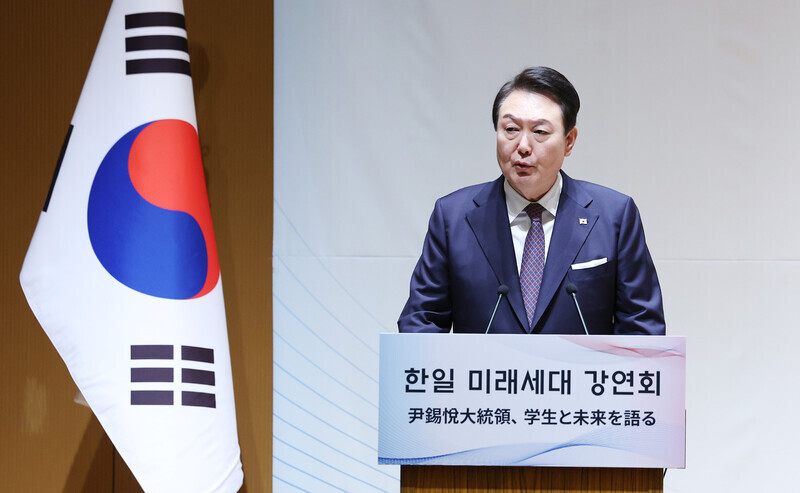hankyoreh
Links to other country sites 다른 나라 사이트 링크
[Guest essay] Yoon’s gormless deal with Japan is no one-off mistake


By Shin Jin-wook, professor of sociology at Chung-Ang University
During his visit to Japan last month, President Yoon Suk-yeol shunned the South Korean Supreme Court’s ruling on Japanese forced mobilization as well as Korea’s National Assembly and public opinion to present the “solution that the Japanese government has been yearning for.”
Furthermore, he returned to South Korea with a long list of agenda items related to Japan’s national interests, without having brought up any of the issues in South Korea’s national interest. The significance of this incident goes far beyond South Korea-Japan relations. We should consider its deeper implications.
First, this marks the starting line of Yoon’s unilateral management of state affairs. After an initial period of chaos, Yoon’s administration established a presidential-centered power structure and began its attack by targeting its political opposition, labor unions and civic organizations, and media that criticized its policies.
It was an act of political framing, an attempt to sway conservative public opinion to score a rebound in the polls. But this time, things were different. This time we could see the president’s dogmatism as he pushed back against the opposition party and the public.
One only need look at the agreement with Japan on the “comfort women” issue inked during the administration of Park Geun-hye to comprehend the danger that such dogmatism can bring. The Park administration signed its “final and irreversible” agreement on a matter involving the dignity of its own citizens without consulting the National Assembly and the will of the people.
This was coupled with a promise to not make an issue of Japanese crimes committed during the country’s occupation of Korea. The arrogance that allowed the government to one-handedly define what was in the national interest and impose its agenda on the Korean people can be seen once again in the Yoon administration.
Second, Yoon’s incompetence as president and leader of his wing is not a mere personal defect but could have profound negative consequences for South Korea in the future. The topics discussed during the Tokyo summit, as reported by the Japanese Ministry of Foreign Affairs and the media, included several critical issues such as the territorial sovereignty of Dokdo, the importation of seafood from Fukushima, and the demand to fulfill the Park Geun-hye era “comfort women” agreement. The very fact that these issues were raised is a red flag.
A democratic administration is not necessarily competent, and an undemocratic administration is not always incompetent. However, an administration that manages to be both undemocratic and incompetent is horrible. This kind of administration is incapable of looking out for the national interest and its people, yet, it wields the power to make important decisions and act without considering public opinion. It’s important to keep a close eye on the president and what happens around them when people aren’t paying attention.
Third, a subservient attitude in which the Korean president prioritizes the public opinion and interests of another country over those of his fellow countrypeople raises doubts about the legitimacy of his administration. Yoon boasted that he had “succeeded in opening the minds of the Japanese,” while ignoring public opinion in South Korea.
He failed to mention that the Abe administration ignored the South Korean government’s efforts to improve bilateral relations, attacked the South Korean semiconductor industry, and attributed the deterioration of bilateral relations to South Korea.
The state is the only organization that has the public responsibility and authority to realize the common interest of the political community. A political community loses its power to bring things together when its leaders are not focused on protecting their own people, their own government, or their own businesses.
Labeling all criticism as anti-Japanese, nationalistic sentiments that stem from a “victim complex” obscures the true nature of any issue. True friendship between nations is built on negotiations and dialogue that take place on an equal footing, between governments that are pursuing their respective national interests.
Fourth, the Yoon administration is, under the guise of strengthening the South Korea-US-Japan alliance, subordinating South Korea to the interests of the US-Japan alliance. Were the escalation of US-China conflict and the strengthening of the North Korea-China-Russia alliance to occasion a “clash of the titans,” the Korean Peninsula could become a flashpoint. To prevent this, the South Korean government will need to strike a good balance between being faithful to its alliances and pursuing its national interest.
However, the current situation in South Korea is such that there are no brakes to control the escalation of tensions on the Korean Peninsula, as the far right’s belligerent perception and strategies on the peninsula are strongly reflected in domestic government politics and the administration’s desire to avoid any external conflicts with the US and Japan. The risk of military conflict is growing as we see that military force is unable to contain North Korea’s provocations. The danger is real.
In the core values of democracy, government capacity, external sovereignty, and peacebuilding, the current administration’s handling of the South Korea-Japan issue has exposed its problems of dogmatism, incompetence, subordination, and escalating confrontation. I am deeply concerned that these are not temporary policy failures that will only last during this administration but are “irreversible” problems that will not be able to be reversed no matter how hard the next government tries.
This is not just us being irresponsible to our generation, but we are also passing on an unpayable debt to future generations.
Please direct questions or comments to [english@hani.co.kr]

Editorial・opinion
![[Column] Tariffs on China: Trump was dumb, Biden dumber [Column] Tariffs on China: Trump was dumb, Biden dumber](https://flexible.img.hani.co.kr/flexible/normal/500/300/imgdb/original/2024/0520/191716191153918.jpg) [Column] Tariffs on China: Trump was dumb, Biden dumber
[Column] Tariffs on China: Trump was dumb, Biden dumber![[Column] What if Seoul took reunification by force off the table? [Column] What if Seoul took reunification by force off the table?](https://flexible.img.hani.co.kr/flexible/normal/500/300/imgdb/original/2024/0520/3017161928630494.jpg) [Column] What if Seoul took reunification by force off the table?
[Column] What if Seoul took reunification by force off the table?- [Editorial] Intensifying US-China rivalry means Seoul must address uncertainty with Beijing sooner than later
- [Column] When ‘fairness’ means hate and violence
- [Editorial] Yoon must stop abusing authority to shield himself from investigation
- [Column] US troop withdrawal from Korea could be the Acheson Line all over
- [Column] How to win back readers who’ve turned to YouTube for news
- [Column] Welcome to the president’s pity party
- [Editorial] Korea must respond firmly to Japan’s attempt to usurp Line
- [Editorial] Transfers of prosecutors investigating Korea’s first lady send chilling message
Most viewed articles
- 1Xi, Putin ‘oppose acts of military intimidation’ against N. Korea by US in joint statement
- 2Kim Jong-un wanted to meet with residents of shelled Yeonpyeong Island in South, Moon recalls in mem
- 3[Column] What if Seoul took reunification by force off the table?
- 4To weigh costs and benefits, Korea must stop treating US troop presence as a sacred cow
- 5Berlin mayor hints at tearing down ‘comfort women’ memorial in city
- 6[Editorial] Transfers of prosecutors investigating Korea’s first lady send chilling message
- 7[Column] Tariffs on China: Trump was dumb, Biden dumber
- 8[Exclusive] Truth commission to seek additional murder charges for figures behind 1980 Gwangju massa
- 9[Column] In Germany, Japan is waging a war over its history with Korea
- 10KEPCO undergoes repairs for cracks in nuclear reactor containment buildings in UAE